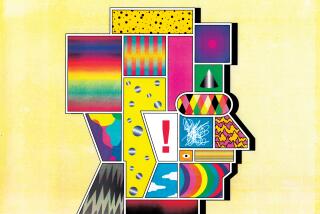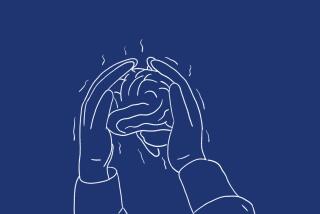Exercise in Frustration
- Share via
OK, I admit it. I’m a catastrophizer.
My career anxieties spill over on a regular basis into my personal life. I grind my teeth at night. I fret over stories, even after they’re in print. I feel I can never write enough to satisfy my editors and readers. I often am overwhelmed when I measure what I should be accomplishing against what I actually get done. Confidence is my short suit.
So it came as no surprise that my adversity quotient, or AQ, doesn’t exactly rank up there in the stratosphere with that of, say, President Clinton or a Nazi concentration camp survivor.
Nope, it’s smack dab in the middle--lumping me in with the vast majority of others who have taken PEAK Learning Inc.’s Adversity Response Profile. Keep this in mind, said Paul G. Stoltz, the Flagstaff, Ariz., performance consultant who developed the exercise, seeking to console me. We’re not talking general population here. About three-fourths of those who have taken the test are professionals, managers and executives. The remaining one-fourth are line employees. So I’m in good company.
The multiple-choice exercise, based on 35 years of research in the field, is designed to measure how one responds to and deals with adversity. Stoltz contends that it is a valid predictor of one’s success, performance, capacity for change, productivity, willingness to take risks, perseverance, energy and health. It is, he says, often more important than how intelligent you are.
To complete the exercise, I read through 14 situations, attempting to imagine myself clearly in each one.
Sample: Your organization falls short of meeting the projected goals.
Then I answered four questions about each situation, including: How much control do you feel you have in this situation? (with answers ranging from 1--No control to 5--Complete control) and To what extent do you feel responsible for dealing with the outcome of this situation? (with answers ranging from 1--Not responsible at all to 5--Completely responsible).
The exercise is designed to measure your CORE score--encompassing Control, Ownership, Reach and Endurance.
The C, or control, component asks the question: How much control do you perceive that you have over an adverse event? Control begins with the perception that something can be done. Consider the executive who turns around a faltering company, a neighborhood activist who fights back a tide of drugs and gangs, or an entrepreneur who takes on the corporate behemoths.
My score: near the low end, which means that I’m likely to perceive things as more out of my control than they need to be. I feel overwhelmed and even, occasionally, helpless.
O, for ownership, asks: To what degree do I own the outcomes of the adversity? My score: fairly high. That means I have a fairly strong sense of ownership. That’s a problem, given my low score on the control element. It could indicate, Stoltz said, that I often feel beaten up because I feel accountable without perceiving myself to be in control. At the same time, by taking ownership, I probably prevent myself from feeling completely out of control.
The R dimension asks: How far will the adversity reach into other areas of my life? Lower AQ responses indicate that the adversity bleeds over into other facets of one’s life. A bad meeting, for example, means a ruined day. The lower your R score, the more likely you are to catastrophize bad events, turning them into an emotional oil spill that consumes your happiness and peace of mind. A high AQ score indicates that one tends not to get demoralized and think that things are worse than they are.
(I scored at the moderately high end on this one--not exactly a match with my experience in life.)
E stands for endurance, asking: How long will the adversity endure? A high AQ person always has the ability to see the light at the end of even the longest tunnel.
Here my score was mid-range, indicating that I probably do a reasonably good job of forging ahead through life’s small to moderate challenges but that I tend to unnecessarily view adverse events as enduring. That might delay me from taking constructive action.
My overall AQ was 141, putting me solidly in the moderate range where the vast majority of other individuals fall (130 to 164). A score of 40 to 94 is low, with 95 to 129 moderately low. A score of 165 to 184 is considered moderately high, with 185 and above high.
My profile, Stoltz said, indicates that I hold myself fairly accountable and feel very responsible. I don’t catastrophize in a disabling way (or so he says), but I often feel that situations are out of my control.
As a result, I probably feel worn down as circumstances accumulate over time. It might, he said, affect my energy, vitality, optimism, sleep, hope and health.
“That’s very normal,” he added reassuringly, “not the least bit rare.”
Now, wait a second, I tell Stoltz, feeling a mite defensive. I’ve weathered my share of adversity--serious illness, romantic breakups, the financial burdens of a single mother, allergies. Hey, I even survived a kitchen remodel and lived to tell about it.
Surviving is not the real point, said Stoltz, who took a moment to reassure me that I was clearly competent and had even earned a level of prestige. “But what I would probably say is, when adversity stacks up, it takes more of a toll than it needs to.” Think of the life you waste, he chided me, worrying and ruminating over things that almost certainly will not turn out as horribly as feared.
OK, he’s got me there. So, I ask, how can I improve on this so-so AQ?
*
Easy, he says. Follow his LEAD. I should:
* Listen to my own response to adversity. Is it a high or a low AQ response?
* Explore the origin of the adversity and my ownership of the result. What portion of the origin was my fault? What could I have done better? What aspects of the result should I own?
* Analyze the evidence. What evidence is there that I have no control? What evidence is there that the adversity has to reach into other areas of my life? What evidence is there that the adversity must last a long time?
* Do something. What additional information do I need? What could I do to gain even a little control over this situation? What could I do to limit the reach of this adversity? What could I do to limit how long the adversity endures in its current state?
By following this list, Stoltz said, any person can move from utter despair to creating a list of actions, some of which can be taken immediately.
And next time I’m inclined to catastrophize? For that, Stoltz said, I need a “neurological interrupt.” In other words, I need to intentionally distract myself and get away from my damaging thought pattern.
His suggestions: Pick up a pencil and focus on it intently, looking for scratches in the wood or a smudge on the eraser.
Or, better yet, slam your hand onto your desktop while yelling “Stop!”
That last one is best tried at home, perhaps when you’re opening an audit notice from the Internal Revenue Service. Now, that’s adversity.
More to Read
Inside the business of entertainment
The Wide Shot brings you news, analysis and insights on everything from streaming wars to production — and what it all means for the future.
You may occasionally receive promotional content from the Los Angeles Times.











